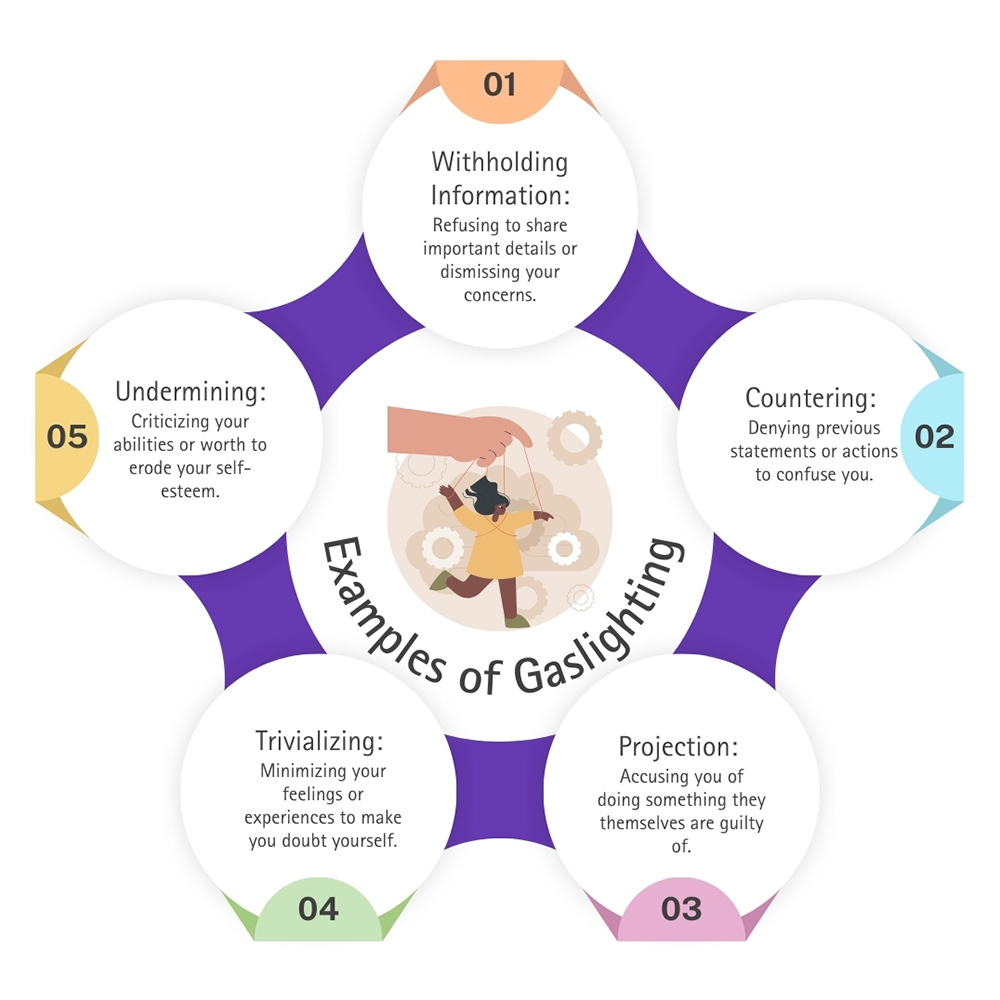What Is Gaslighting?

Gaslighting is a form of emotional abuse where the abuser distorts information to make the victim question their perception of reality. The gaslighter can make you question your beliefs, feelings, and memories. Gaslighting is usually subtle at first but can lead to the victim feeling powerless and trapped.
How to Respond to Gaslighting?
The best way to combat gaslighting is to bring your awareness to it. Once you recognize it happening, you can begin to take action to protect yourself. The gaslighters’ goal is to manipulate you so it is important to be aware and prepared on how to respond.
If you feel you cannot or don’t want to leave the relationship, some ways to respond to gaslighting include:
- Acknowledge your feelings: Remember, the gaslighter’s goal is to make you doubt your perception of reality. Acknowledge your experience and your feelings.
- Set boundaries: Let the other person know that you are aware of their behavior. Setting boundaries involves using “if/then” statements, such as “If you refuse to listen to my concerns, then I will leave the conversation.” The most important step in setting boundaries is enforcing them.
- Remember your truth: If you learn to trust yourself, you will trust your memories and your reality. This will give the gaslighter less power to manipulate you.
- Seek support: Talking to a therapist can help you create a strategy to overcome the emotional abuse of gaslighting.
By understanding gaslighting and increasing self-awareness, you can begin to protect yourself from emotional abuse in the future. Your therapist can help guide you to improve your insight and empower you in navigating gaslighting behaviors.
Explore Gaslighting Trauma Therapy Online or In-Person
What Is an Example of Gaslighting?
The different types of gaslighting include:
- Withholding information: Gaslighting can include withholding information or details to make the victim doubt their perception of reality. It can also be refusing to listen to your feelings or concerns.
- Countering: Gaslighting can include the manipulator denying things they previously said to make you doubt your memories.
- Projection: The gaslighter can accuse you of doing or feeling something they are doing or feeling. For example, a partner who is cheating may accuse you of cheating with no actual evidence.
- Trivializing: The gaslighter may try to minimize your feelings and experiences. This makes the victim feel they are overreacting or their concerns are not valid.
- Undermining: The gaslighter will try to undermine your self-confidence by making you feel unworthy or trying to convince you that you are unlovable.
If you or someone you know is experiencing gaslighting trauma seek assistance from a therapist who will help you reclaim your emotional well-being and self-esteem.

What Is Gaslighting in a Relationship?
Gaslighting in a relationship is the act of manipulating others to make them doubt themselves. The gaslighter’s goal is to gain power over you and manipulate the situation.
Gaslighting in a relationship may include:
- Victim blaming such as assigning blame to someone who experienced any type of abuse
- Making someone doubt themselves and the validity of their feelings
- Silent treatment as a form of punishment
- Distorting the truth, such as by omission
- Calling you “too sensitive” or “dramatic”
- Convincing you that you are overreacting
- Accusing you of doing something they did
- Using your insecurities against you
- Accusing you of being the problem in the relationship or the abuser
Gaslighting in a relationship will often feel confusing and disorienting. It can make you doubt your interpretation of events. As a result, you may feel anxiety, depression, and loss of confidence.
Embrace Healing The Power of Trust in Therapeutic Relationships
“In my experience, the most effective aspect of therapy is the therapeutic relationship. Establishing trust between a client and clinician is the first step to healing.”
What Happens When You Ignore a Gaslighter?
Ignoring a gaslighter is the first step to stopping the abuse. This will prevent the intensity of the negative effects this form of emotional abuse can have on you. Refusing to engage with the gaslighter can break the cycle of abuse. Ignoring the gaslighter is just the first step. It is important to seek support from a professional in dealing with this situation.
After working with many gaslighting clients, I found the most effective strategy has been helping my clients set boundaries and enforce them. I would love to help you learn why people become gaslighters, how you can act in the situation, and prevent future emotional abuse.
How to Recover From Gaslighting?
Recovering from gaslighting can be difficult, but with the help of a professional, you can recover from PTSD from gaslighting.
Some steps you may want to take include:
- Acknowledge the abuse: It is important to have awareness of the emotional abuse and the effects it has on you.
- Practice self-care: Focus on activities that you enjoy to improve your mental well-being. Practicing self-love will improve your self-confidence after emotional abuse.
- Seek support: Talking with others who you trust or who have experienced similar situations can help you understand your feelings and gain insight. Peer support can also help you learn new coping strategies to deal with your abuser.
- Challenge negative thoughts: Gaslighting can cause you to think negatively about yourself and the world around you. Trying to change these thoughts will cause you to have more positive feelings.
- Consider therapy: Together with the help of a trauma therapist experienced in healing gaslighting trauma you can begin to bring awareness to your experience, learn how to overcome the negative effects, and learn coping skills to prevent future gaslighting.
The Trauma Therapy Center counselors specialize in helping their clients overcome the negative side effects of gaslighting trauma.
What Are Some Gaslighting Phrases?
Some phrases that can be used by a gaslighter include:
- “That makes no sense. I don’t know what you’re talking about.”
- “I never said that.”
- “Stop overreacting. It’s not that serious.”
- “I was just joking.”
- “I would never do that to you. You’re delusional.”
- “That never happened. You’re imagining things.”
- “You’re just being paranoid.”
It is important to be aware of gaslighting behavior to be prepared for when you notice it. Your therapist can help you create a plan of healthy responses.
How Does Gaslighting Therapy Work?
Gaslighting therapy involves working with a therapist who specializes in trauma therapy and emotional abuse from gaslighting. Your therapist will help you understand the events and actions that are known as gaslighting, process your experience and feelings, develop coping skills, and set boundaries to prevent further cycles of abuse.
Trauma Therapy Center therapists specialize in trauma therapy, especially emotional abuse. They are highly experienced in utilizing evidenced-based approaches for emotional abuse such as cognitive behavioral therapy (CBT) and rational emotive behavioral Therapy (REBT).
How Long and Frequent Are Gaslighting Therapy Take?
The length of gaslighting therapy depends on your individual needs and circumstances. Your therapist will work with you to create an individualized plan based on your level of emotional abuse and your personal goals. Typically you will meet with your trauma therapist once per week for 30-minute to one-hour sessions, depending on your schedule.
Is Gaslighting Therapy Covered by Insurance?
To find out if gaslighting therapy is covered by your insurance you can call the number on the back of your card and ask for a list of trauma therapists in your area. To get gaslighting therapy covered by insurance you can research trauma therapists in your area and contact the office.
Who Benefits From Gaslighting Therapy?
Typically, the victim of gaslighting benefits from therapy by developing awareness of their trauma symptoms and learning coping skills to improve self-esteem. If the abuser is willing, therapy can be beneficial as well to help the individual process their trauma and underlying reasons for acting out.
What Are the Goals of Gaslighting Therapy?
The goal of gaslighting is to help you bring awareness to your symptoms from gaslighting, process your trauma, and reframe the negative beliefs you have as a result of the abuse.

